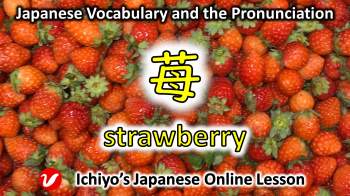The Japanese vocabulary「苺 (いちご、イチゴ、ichigo)」means “strawberry.” Please learn the pronunciation and the example sentences.
Japanese vocabulary and the meaning
| Key Word | 苺、イチゴ |
| Hiragana | いちご |
| Romaji Reading | ichigo |
| English Meaning | strawberry |
The correct Japanese pronunciations
Please learn the pronunciation by watching the attached video. You can also learn example sentences.
Our YouTube channel: Ichiyo’s Japanese YouTube Channel
The example Japanese sentences
It is important to have skills in both non-honorific and honorific languages in order to use Japanese correctly.
I bought strawberry-flavored shaved ice.
Plain form:
イチゴ味のかき氷を買った。
Ichigo aji no kakigōri o katta.
Polite form:
イチゴ味のかき氷を買いました。
Ichigo aji no kakigōri o kaimashita.
My parents grow strawberries.
Plain form:
両親はイチゴを栽培している。
Ryōshin wa ichigo o saibai shite iru.
Polite form:
両親はイチゴを栽培しています。
Ryōshin wa ichigo o saibai shite imasu.
I made strawberry jam at school.
Plain form:
学校でいちごジャムを作った。
Gakkō de ichigo jamu o tsukutta.
Polite form:
学校でいちごジャムを作りました。
Gakkō de ichigo jamu o tsukurimashita.
I’ll put strawberries on the cake.
Plain form:
ケーキにイチゴをのせる。
Kēki ni ichigo o noseru.
Polite form:
ケーキにイチゴをのせます。
Kēki ni ichigo o nosemasu.
I plan to go strawberry picking with my boyfriend tomorrow.
Plain form:
明日、彼子と一緒にイチゴ狩りへ行く予定だ。
Ashita, kareshi to issho ni ichigo-gari e iku yotei da.
Polite form:
明日、彼子と一緒にイチゴ狩りへ行く予定です。
Ashita, kareshi to issho ni ichigo-gari e iku yotei desu.
Do you like strawberry red bean rice cakes?
Spoken and non-honorific language:
いちご大福は好き?
Ichigo daifuku wa suki?
Polite form:
いちご大福は、好きですか。
Ichigo daifuku wa, sukidesu ka.
